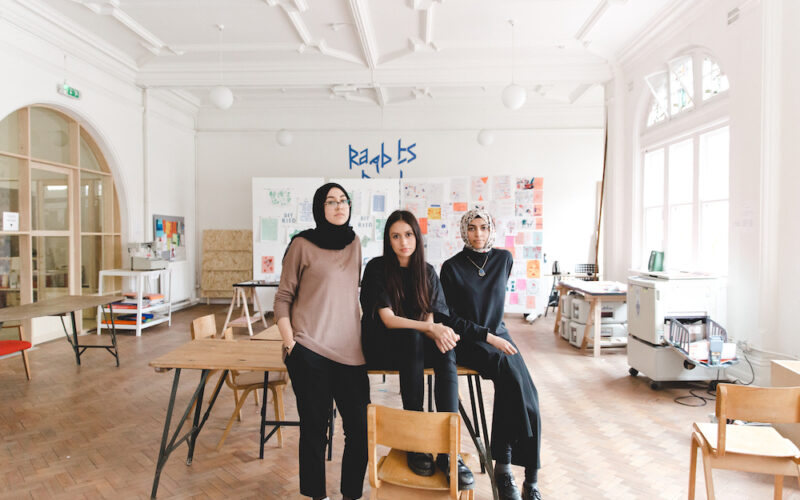The following is an adapted excerpt from Helen Armstrong’s new book, Big Data, Big Design: Why Designers Should Care About Artificial Intelligence. Why should a designer care about machine learning (ML)? Fair question, right? ML consists of algorithms—in essence a set of task-oriented mathematical instructions—that use statistical models to analyze patterns in existing data and then make predictions based upon...
Afraid to Ditch Your Job and Pursue Your Passion? It Worked for Holly Ovenden
Holly Ovenden was exhausted. Having graduated college with a degree in physical therapy, she’d spent four years working on the admin side of medical practices. The hours were long and dull. The work was stressful and unfulfilling. Moreover, nothing about it was creative in any sense—so Ovenden’s natural inclinations toward painting and drawing were relegated to evenings and weekends. Growing...
Epicene, a Baroque Typeface Celebrating Ornamental Idiosyncracy
Name: Epicene Text and Epicene Display Designer: Kris Sowersby Foundry: Klim Type Foundry Release Date: September 2021 Back Story: Building out from 18th-century European typographic traditions, Epicene is a new Baroque-style typeface and a reconciliation of the work of rival 18th-century Dutch typographers Jacques-François Rosart and Johann Michael Fleischmann. Fleischmann was known for beautiful text typefaces, while Rosart shone as...
The Graphic Support Group Podcast Asks Designers to Listen Deeper and Feel More Broadly
In my limited 45 minutes of bi-weekly therapy sessions I often struggle to let my design drama take up time from some deeper interpersonal digging I get to do with my therapist. When I do share design drama, client crises, or time-management struggles, my therapist kindly nudges me by saying, “This is not my realm of expertise.” Beyond the occasional...
Why Pay Transparency Matters in Job Negotiations
When Lesley Carter*, 26, first saw the salaries listed in the Graphic Design Salary Transparency Spreadsheet in January 2020, she took several screenshots. Carter, a graphic designer in New York City, had been looking for a job for several months, but she wasn’t sure what a fair salary for her particular skill level should look like. For Carter, the information...
Adam Pendleton’s Radical Typography as Protest
Spray paint, bold black, and capital letters are everywhere in Adam Pendleton: Who Is Queen? On view through January at the Museum of Modern Art, the exhibition occupies the institution’s dramatic hundred-foot-tall atrium. Three towering wooden scaffolds hold paintings, a projection screen, lighting fixtures, and speakers playing an audio collage of music, poetry, and protest chants. In text-based paintings on...
Don’t Be Distracted by Facebook Going Meta
During the First and Second World Wars, German U-boats menaced Allied ships. Large silhouettes on open flat terrain are difficult to disguise, and with the tell-tale smokestacks working away, torpedo attacks were relentless. Various camouflage approaches were put forth and found lacking (yep—even ships disguised as floating islands) until a reserve lieutenant in the Royal Navy named Norman Wilkinson made...
Three Publishers Get Real About Independent Publishing
Much of the work we do as designers, publishers, and artists remain mystified to our peers and the community at large. This is especially true in the last year or so, as the pandemic changed the norms of working, making, and living around the world. As a designer and artist myself, and as someone who has been in and out...
New Wave Graphics Are the Most Influential Designs You’ve Probably Ignored
If you were asked to name the seminal, discipline-shifting “movements” that shaped graphic design, chances are they’d include Swiss International Style, Bauhaus, punk, psychedelia, and maybe even Constructivism, De Stijl, and Pop Art on the more fine art side of things. Most people would be fairly unlikely to include new wave, yet the graphics that emerged around the music of that era (late...
Cardone, a Scotch Roman-Inspired Typeface with a Modern Twist
Name: Cardone Designer: Fátima Lázaro Foundry: 205TF Release Date: September 2021 Back Story: Cardone got its start in 2016 as a student project at the EsadType postgraduate course in Amiens, France. Lázaro’s goal was to create an optimized type family for editorial use, striking a balance between aesthetic experimentation, functionality, and legibility. During her research, she found herself drawn to...
Processing: the Software that Shaped Creative Coding, Part II
This is part II of the Processing oral history. Read part I here. As Processing became one of the primary environments for creative coding in the early aughts, a community started developing around it. People were eager to use the tool, and a smaller subset of them wanted to help develop the infrastructure required to maintain the growing piece of...
Processing: the Software that Shaped Creative Coding
This is part I of the Processing oral history. Part II will publish next week. Computers and design have long been intertwined. This relationship dates back to the 1960s, when computational pioneers used code to create novel forms. Since then, programming’s grip on designers has only tightened, even as it’s been obscured by the user-friendly interfaces of modern creativity software....


